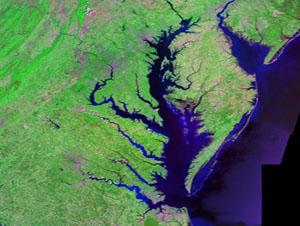Lawmakers: Remove EPA’s enforcement of water standards
A satellite image of Chesapeake Bay (Photo courtesy of Wikimedia Commons)
Story by Mitra Taj for Living on Earth. Listen to audio above for full report.
The U.S. House of Representatives recently passed a bill that would water down the federal government’s responsibilities with regard to the Clean Water Act. Instead of enacting regulation through the Environmental Protection Agency, the bill proposes that clean water responsibility should go to the states.
Historically the Clean Water Act, passed in 1972, has not allowed the federal government to regulate the biggest polluters to our nation’s water supply: agricultural run-off. But now, Republican supporters of the bill, like Rep. Rob Bishop of Utah, believe that the Clean Water Act is long overdue for amendments to rein in the EPA. From the floor of the House, Bishop retold a story of a constituent who lost his beet farm because the EPA mistook his flooded property for protected wetlands.
“It is time to respect the idea that states care as much about their own states as the federal government would care about their states,” Bishop said. “They probably care more.”
But it was due to shortcomings in state action that the Clean Water Act was passed at the federal level. Since the 1980s, the states that are part of the Chesapeake Bay watershed have been given over $6 billion and made many promises to clean up the bay. So far, none of their clean-up goals have been met.

“They just haven’t done it. Agreement after agreement has been broken. The states haven’t done what they needed to do,” said Doug Siglin, federal affairs director for the Chesapeake Bay Foundation. The group sued the EPA for not enforcing an overarching clean-up plan for the bay. Since the lawsuit, the EPA has developed a stricter “pollution diet” for the seven jurisdictions that run off into the bay that must show results by 2025.
“Without that authority, without the EPA telling the states what to do, I’m very confident that [the clean-up] wouldn’t happen,” Siglin said.
But Kathy Mathers from the Fertilizer Institute points out that the EPA should not be able to regulate the states when it is not clear how much pollution each state is producing.
“For the EPA to step in and intend to implement a rule for individual states for an incredibly huge area, without even knowing what the sources of those nutrients are, we have a real problem with that,” Mathers said.
The bill has to pass through the U.S. Senate where its likeliness to pass is tenuous.
“If this were a normal year, this legislation would not have a chance in the Senate. Pending an agreement about the debt ceiling, there’s no predicting what will happen,” Siglin said. “A bill like this might sneak through.”
Read more on the Living on Earth website.
———————————————————–
Hosted by Steve Curwood, “Living on Earth” is an award-winning environmental news program that delves into the leading issues affecting the world we inhabit. More about “Living on Earth.”
